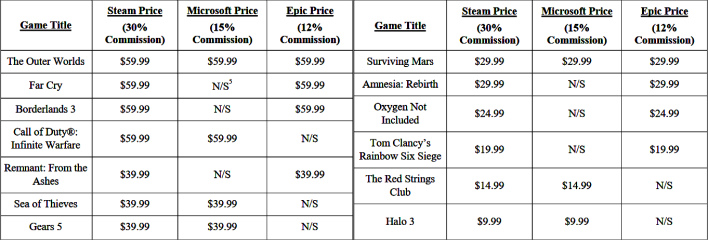Valve has recently been in some hot water as the EU’s European Commission slapped the games company with a
$1.9 million fine over “geo-blocking.” Now, some gamers are suing Valve in California over anti-competitive clauses in developer agreements. Valve and multiple other developers have been named defendants, alleging that the companies entered a competition-stifling contract with a “most favored nations” (MFN) clause.
In this case, the MFN clause is an agreement where game developers arrive at a specific price of a game on the
Steam platform, and then that price will remain the same on all other platforms. As the suit explains, “Because of this Most Favored Nations provision, or 'MFN,' other platforms are unable to compete on price, thereby insulating the Steam platform from competition.” As such, Valve appears to “abuse the Steam platform’s market power” with this clause.
As it stands, Valve does appear to have a bit of a monopoly on the
gaming market, as the suit states that it is approximated that 75% of all PC games sold in the U.S. go through Steam. On the contrary, some could argue that they were the first to make a digital games store successfully and grew because of that. Now, platforms like Epic Games and the Microsoft Store are slowly growing, enticing developers with lower commission fees and better agreements, but may not be enough to truly compete.
Obviously, as the lawsuit explains, it would be in the developer and game publisher's best interest to offer lower prices on platforms that offer lower commissions. More traffic can be driven to the game, thus earning more money for the creators. For some reason, however, that is not happening, as shown by a chart of prices on different platforms put together by the plaintiffs.
However you interpret Valve’s monopoly status, there are some oddities occurring with the PC games market. The pricing versus commission rates on a platform do not line up, and the lowest common denominator is Valve it seems. Hopefully, we will find out more about this case soon, but let us know what you think of Valve’s alleged practices in the comments below.

Nathan Ord
Nathan Ord is a tech nerd through and through. Following any technology, from home and business applications to VR, anything is up his alley. Starting out as the family repair guy and local "tech expert" for those around him, he helped out wherever he could. Nathan came aboard HotHardware in 2020 and continuously enjoys what he does. In his free time, he enjoys volunteering, playing video games, and just relaxing with friends.
Opinions and content posted by HotHardware contributors are their own.



